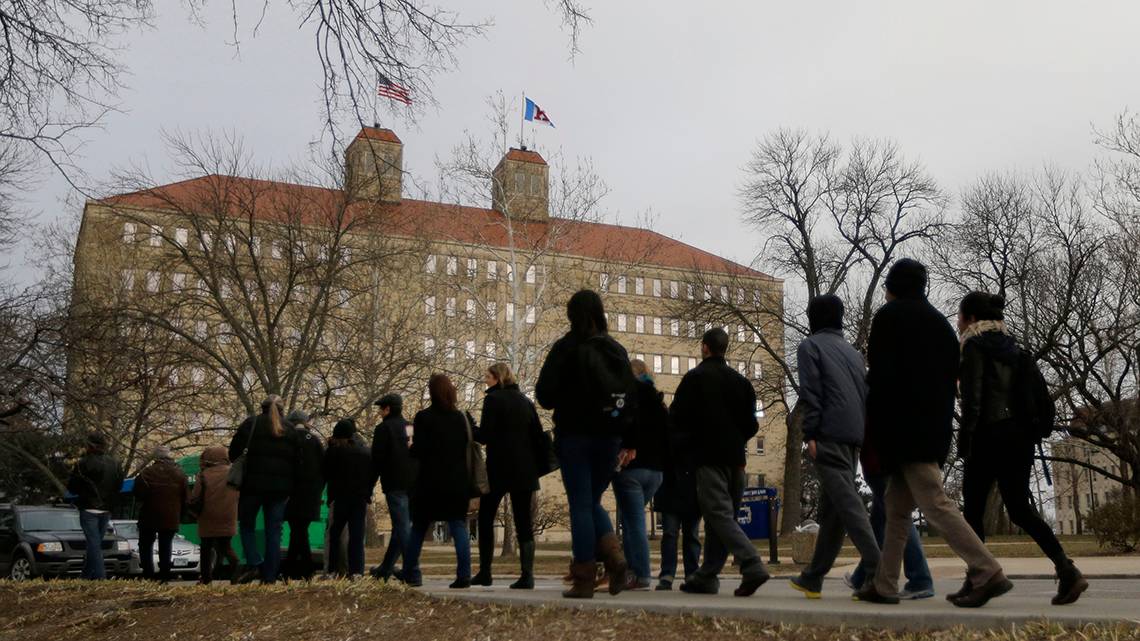Lawmakers voted to advance the measure 81-39 along party lines Thursday.
While the legislation does specifically name DEI statements as ideas university hiring managers cannot require prospective hires or students to agree or disagree with, it also forbids universities from requiring candidates to make a statement about “any political ideology or movement.”
A 2022 survey from the American Association of University Professors found that 21.5% of surveyed universities indicated they include such criteria in their tenure standards, and an additional 38.9% are considering adding the statements.
According to some Kansas Republicans, the statements are required by public universities in Kansas during the hiring process, too.
Rep. Steven Howe, a Salina Republican, spearheaded the legislation. He told The Star Wednesday that the measure would protect academic freedom and freedom of speech on college campuses because it would not require candidates to agree or disagree with any political ideology.
“People don’t want to be discriminated against because they might not have that experience,” he said. “Some of the postings I’ve seen have nothing to do with diversity, equity or inclusion.”
“Instead of a merit-based approach, universities have chosen to embrace ideologies that discriminate against those who do not agree,” he said.
Opponents of the measure say the bill is unnecessary and that it is a solution in search of a problem.
Rep. Kirk Haskins, a Topeka Democrat who has worked as a professor at Baker University for two decades, said he has never encountered anyone with an issue pertaining to DEI.
Instead, DEI actually has positive impacts by creating more jobs and fostering an inclusive environment, he said.
“This bill is an overreach and compromises academic freedom,” he said. “They would not try to do this with any other industry.”
The legislation outlines a method for filing DEI complaints and gives universities time to correct unlawful behavior. But civil lawsuits could charge public universities up to $10,000 per violation. The civil penalties would be deposited into the State Scholarship Program account, a fund seeking to help students in financial need.
If enacted, the legislation would add Kansas to a list of more than 20 states – including Kentucky, Utah and South Carolina – weighing limiting DEI programs or statements in higher education, representative of a nationwide GOP push. Earlier this week, Alabama signed the measure into law.
Republican efforts to eliminate DEI statements hinge on the argument that they violate free speech and are discriminatory in university hirings, proponents have said.
Kansas Democratic Gov. Laura Kelly generally does not comment on legislation before it’s on her desk, but last year she vetoed a similar measure inside the state’s budget. Restrictions on DEI provisions would limit a university’s ability to facilitate open dialogue and challenge their thinking, she said.
But Republicans are hopeful this version of the bill will be looked upon more favorably after amending the legislation to reduce its punitive nature.
Rep. Barb Wasinger, a Hays Republican, said the language in this year’s bill has a much better chance of climbing the legislative ladder, but said it is likely Kelly will veto the measure.
“The bill has significantly been softened through discussions with other groups,” she said. “So I think it’s got a good chance of going all the way up.”
Speaker of the House Dan Hawkins, a Wichita Republican, echoed other Republicans and said the bill was a compromise and that university presidents, the Kansas Board of Regents and other stakeholders were neutral on the matter.
“This truly is a compromise bill,” he said.
Rep. Ford Carr, a Wichita Democrat, said the bill’s language was unfair because it targeted only DEI. The word “patriotism” had been previously removed from the bill before it hit the floor, and he advocated for adding it back.
“I’m only saying to be fair,” he said. “It originally included the term patriotism, so let’s put it back so it can be as fair as possible and be judged on its merit.”
Another point of contention is the bill’s lack of concrete definition of DEI, which opponents say would cause confusion among universities about what the term means and how they could incur a fine.
Rep. Tom Sawyer, a Wichita Democrat, said a definition was needed to provide universities clarity.
“It’s hard for me to pass a bill punishing universities for doing something we don’t define,” he said.
Last month, a legislative audit presented in the House Committee on Higher Education Budget revealed that public Kansas universities spent a total of $45 million on DEI programs – $9 million of which came from state dollars – with the majority put toward salary and benefits for staff.
But since the Legislature does not provide a standard definition of DEI, the audit said the state universities who reported these numbers also gave differing definitions, potentially calling into question the accuracy and consistency of the data.
Howe, who chairs the Higher Education Budget Committee, said the term did not need to be defined since the universities’ job applications and descriptions he reviewed already made it clear.
“It’s clearly in those job descriptions,” he said. “I don’t see a need to define it in order for this bill to have full effect.”
